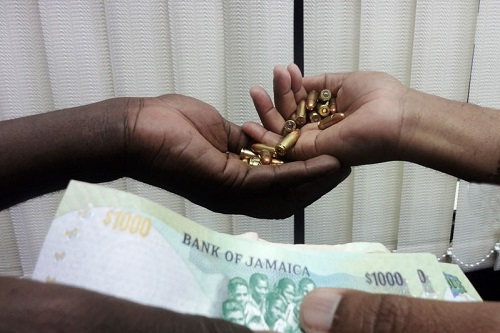By
Ricardo Swire
The gunman enjoys fearful status in Jamaica’s cultural inventiveness. Sinister, romantic, feared and celebrated, from a safe distance observed with terror and a special affection. Local dancehall music is endlessly preoccupied with his badness and in particular his guns. Many DJs have a feature on turntable mixers that mimic the sound of gunshots. Sound systems, in even the most remote communities, often resonate like a small war zone. One local dance poster read “Leave your machine and bring your queen,” shooters from Trench Town and Tivoli in Kingston the most notorious.
Successive governments have been dumbfounded by the island’s proliferation of guns. On November 1, 2016 Jamaica’s Firearms Licensing Authority (FLA) Chief Executive Officer resigned. Government designated the Director of Protective Security to perform the FLA CEO’s duties. Before re-assignment the small arms control policy expert worked as the Government officer responsible for both local and international firearm strategy matters. In February 2017 a critical Ministry of National Security Assessment report on the FLA’s operation was tabled.
Formed in 2006 the FLA took over the issuance of firearm licenses from the Jamaica Constabulary Force (JCF). In 2007 the FLA issued seventy-six firearm licenses, 2010 permit applications skyrocketing to two thousand, three hundred and eighty-six. The Authority receives an average five applications monthly, processed in six months. Overwhelming demand defeated the FLA’s procedure and it actually takes one year to complete.
In 2009 the FLA revoked more than forty-five firearm licenses. In 2010 the Authority started to probe questionable permits, subjects the owners of different pistol brands of similar caliber, 9mm being most common. The FLA Chairman alluded that several members of the island’s security forces, private security companies and entrepreneurs were “persons of interests.” The retired JCF Assistant Commissioner said several of forty-five withdrawn firearm licenses were due to Firearms Act breaches and failure to conduct compulsory auditing.
Originally firearm license holders, who missed three consecutive renewal dates were subject to the FLA’s “Late Renewal Process” that requires recorded fingerprints and antecedent. Since July 2011 the FLA’s standards and rigidity have declined. Several licensed firearm holders breach terms and conditions of private concealed carry. Such individuals also fail to register and present new guns for inspection. Payment of annual fees another popular delinquency.
The FLA lowered qualification test scores. A handgun requires eight strikes from ten discharges, reduced from ten of ten. Shotgun proficiency needs four of five steel plate hits. Adjusted from five of five for success. There was “temporary elimination” of the Authority’s written tests during a re-drafting period. In 2011 the FLA chairman confessed; “It was difficult and senior people in the army, the gazette ranks, people (private security) were failing the test.” The FLA eliminated compulsory medical exams and tax compliance requirements.
The Authority’s dilemma caused America to suspend firearm exports to Jamaica, while its Embassy in Kingston conducted an independent review of the island’s firearm licensing approval process. A booming local underworld “guns-for-ganja” trade continues to be the main catch for local fishermen, who transport marijuana to neighboring Haiti and return with mostly American made unregistered pistols, revolvers and assault rifles sourced from Puerto Rico and Miami. Small arms similar to the US made Glock 27 pistol, with a magazine containing thirteen .40 cartridges, seized Sunday July 23, 2017 at 10:20pm by a JCF Hunts Bay patrol in Kingston 11.
Section 42 of Jamaica’s Firearms Act empowers JCF officers to stop and search any vehicle and person within, suspected to be carrying a firearm, without a warrant. During one JCF operation the Munster Road, St Andrew discovery of a massive guns and ammunition cache added to the FLA’s accountability issues. The Police Commissioner linked the discovered firearms to a rogue Inspector and Sargent, both convicted of stealing weaponry from the JCF Armory on Elletson Road in Kingston.
In April 2013 the FLA replaced licensed firearms holders’ standard booklet with a novel “high-security” identification card. The license is affixed with the bearer’s picture and fingerprint data. A smartphone app, interfaced with the Authority’s database, also projected. According to Ministry of National Security intelligence reports the booklet became susceptible to fraud, demonstrated by incidents of photograph tampering.
In October 2016 a cryptic scenario surrounded FLA documents that belonged to a businessman, accused of murdering a seventeen year old male. His firearm license documentation mysteriously disappeared. The last FLA file movement was recorded on Tuesday April 14, 2015 when an employee assigned to the CEO’s office requested the murder suspect’s documents from the FLA’s registry.
The Authority did not revoke the businessman’s Firearm License, during the JCF investigation, although he refused to surrender the gun for ballistic tests. He was prosecuted for the teenager’s murder but released due to lack of evidence. On Thursday June 29, 2017 JCF officers asked for additional data on the licensed firearm holder. Following this the FLA’s Chairman officially requested Major Organized Crime & Anti-Corruption Agency (MOCA) detectives to investigate circulating inferences about the Authority’s Deputy Chairman.
On July 13, 2017 the businessman’s firearm License was withdrawn. On Monday July 31, 2017 the FLA spearheaded an island-wide enforcement operation and seized several guns from delinquent license firearm holders. Over five thousand documented individuals, unable to meet the July 29, 2017 closing date for registration and fee payment, face disciplinary measures.
This is a repeat of September 2013 when Jamaica’s licensed gun owners were threatened with “arrest for illegal possession of a firearm” if found carrying after their permits expired. The FLA CEO remarked; “People have left firearms at police stations for two years and then retrieved them. Some have left firearms at stations for 10 years and have not gone to retrieve them.” New intelligence verified some documented firearm license holders have not physically touched their gun or resided on the island since 1998.
Ricardo Swire
Ricardo Swire is the Principal Consultant at R-L-H Security Consultants & Business Support Services and writes on a number of important issues.



No Comments Yet!
You can be first to comment this post!